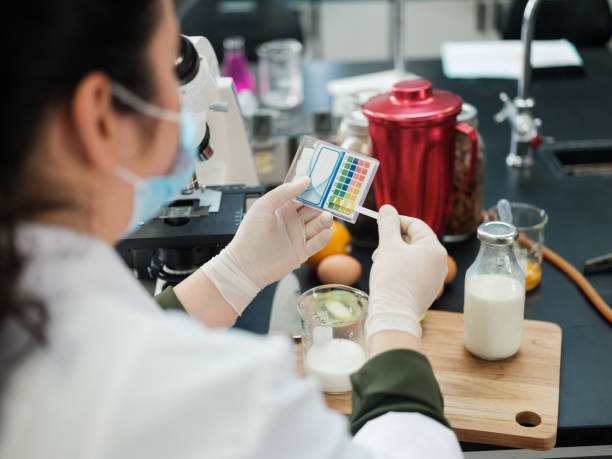In a world where food safety is of utmost importance, food testing regulations in India is subject to strict regulations, with a primary focus on comprehensive food testing. This blog delves into the details of these regulations enforced by the Food Safety and Standards Authority of India (FSSAI). It covers various aspects such as FSSAI standards and compliance, mandatory testing procedures, documentation, accredited laboratories, and emerging trends. The post aims to provide a thorough guide for businesses and individuals navigating the complexities of food testing compliance. The objective is to provide readers with valuable insights to maintain safety standards, thereby contributing to a healthier and more secure food ecosystem in India.
Understanding the Landscape:
India, known for its diverse culinary traditions and expansive food industry, places great emphasis on ensuring the safety and quality of its food products. The regulatory framework for food testing is primarily overseen by the Food Safety and Standards Authority of India (FSSAI). As the apex body in this domain, the FSSAI plays a crucial role in formulating comprehensive regulations and standards. These regulations are designed with a singular focus: to guarantee the safety and hygiene of the myriad food products circulating within the country. Acting as a central authority, the FSSAI establishes guidelines that govern various aspects of the food industry, promoting uniformity and adherence to stringent quality and safety benchmarks. Through its regulatory functions, the FSSAI significantly contributes to fostering consumer confidence and maintaining the integrity of India’s diverse and dynamic food landscape.
Key Aspects of Food Testing Regulations
1. FSSAI Standards and Compliance:
The Food Safety and Standards Authority of India (FSSAI) plays a crucial role in establishing clear standards for various food products. These standards encompass important aspects such as allowable additives, contaminants, and labeling criteria. It is obligatory for food industry businesses, including manufacturers, processors, and distributors, to comply with these standards. Obtaining the FSSAI license is a legal requirement for these entities, ensuring adherence to the specified norms and assuring the safety and quality of food products in the market.
2. Mandatory Testing Procedures:
Ensuring the safety and quality of food products is a rigorous process. They undergo mandatory testing for a range of parameters, including microbiological contaminants, chemical residues, heavy metals, and adulterants. To maintain the integrity of these testing procedures, they must be conducted exclusively in laboratories approved by the Food Safety and Standards Authority of India (FSSAI). This stringent requirement is in place to guarantee the accuracy and reliability of the test results, assuring consumers that the food they consume complies with the highest standards of safety and quality set by the regulatory authority.
3. Documentation and Record-Keeping:
In the realm of food testing compliance, thorough documentation plays a key role. Businesses in the food industry must maintain comprehensive records covering testing procedures, results, and quality control measures. This documentation is crucial for compliance, showing that the required testing protocols have been diligently followed and providing a record of the outcomes. Additionally, these records must be kept for a specified period to ensure traceability of the entire testing process. This not only serves as a reference for internal quality control but also helps with regulatory audits. By maintaining meticulous records, businesses not only meet compliance requirements but also help create a transparent and accountable food supply chain.
4. Importance of Accredited Laboratories:
The Food Safety and Standards Authority of India (FSSAI) strongly emphasizes the use of accredited laboratories for food testing. Accreditation validates a laboratory’s competence and adherence to recognized standards, ensuring the reliability and credibility of testing results. Businesses in the food industry are urged to exclusively partner with laboratories that meet FSSAI’s stringent accreditation criteria. This not only aligns them with industry best practices but also enhances the integrity of their testing processes. Collaborating with accredited laboratories upholds FSSAI’s standards and instills confidence in the accuracy and authenticity of testing outcomes.
5. Emerging Trends in Food Testing:
As technology advances, the field of Food Testing Regulations in India shifting towards the adoption of rapid and innovative testing methods. These methods aim to improve the efficiency and accuracy of the testing process, providing quicker and more precise results. Businesses in the food industry are urged to stay updated with these technological developments to align their testing practices with the evolving landscape. Embracing these advancements enhances the efficiency of testing procedures and helps businesses meet regulatory standards, contributing to a safer and more robust food supply chain.

Navigating Compliance
1. Engage with FSSAI Guidelines:
When navigating food testing regulations in India, businesses should always consult the guidelines and updates provided by the Food Safety and Standards Authority of India (FSSAI) to stay informed about regulatory changes. It is also crucial to actively participate in FSSAI-organized training programs and workshops, as this will improve understanding and ensure compliance with evolving standards. This proactive approach helps businesses stay up to date, aligning their practices with the latest industry insights and technological advancements, ultimately contributing to a safer and more compliant food industry.
2. Collaborate with Accredited Laboratories:
To guarantee the reliability of food testing results, businesses should partner with accredited laboratories that adhere to strict standards. It’s also important to regularly assess and update testing protocols to align with the latest industry standards, methodologies, and technological advancements. This approach not only ensures regulatory compliance but also shows a commitment to upholding quality and safety in the food industry.
3. Invest in Training and Skill Development:
To guarantee the competence and flexibility of staff engaged in food testing, companies need to allocate resources to thorough training programs. Ongoing learning and development efforts are crucial to keep staff updated on advancing testing methods, allowing them to quickly adjust to changes in regulations and technology. This proactive strategy enhances the overall quality, dependability, and adherence to standards of food testing procedures in the industry.
Conclusion:
In conclusion, navigating food testing regulations in India requires a comprehensive understanding of FSSAI standards and a commitment to compliance. Businesses that prioritize food safety through rigorous testing and adherence to regulations not only ensure the well-being of consumers but also build trust and credibility in the market. By staying proactive and informed, the food industry can contribute to a safer and healthier food ecosystem in India.











